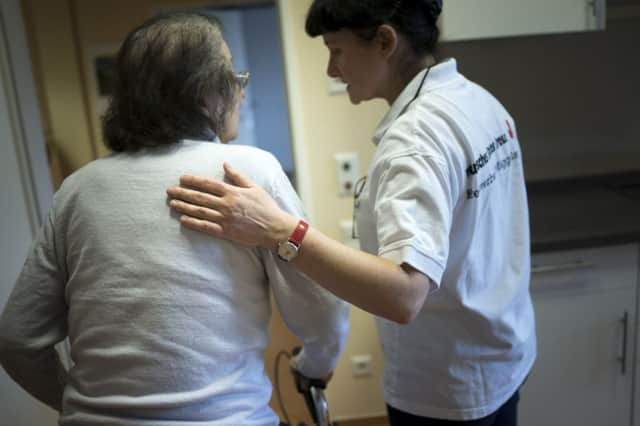Drug plight of dementia sufferers failed by NHS


A report by the Mental Welfare Commission (MWC) for Scotland found 84 per cent of patients were on at least one psychotropic medication, used to deal with symptoms such as anxiety, distress or depression, while over a third (34 per cent) were taking three or more drugs.
The reviewers also raised the possibility that in some cases treatment was given to patients without proper authorisation.
Advertisement
Hide AdAdvertisement
Hide AdAmong other concerns highlighted in the report into care of dementia patients in long-term NHS care were that more than half (53 per cent) had not been outside in the previous month even though it was summer, while 73 per cent had not been on an outing from the unit in the previous three months.
The MWC visited 52 NHS units providing longer-term care for people with dementia, including those in hospitals or care homes, and reviewed the care of 336 patients.
The report said: “While we found that many people were receiving good quality care in a suitable environment, we also found units where the care and/or the environment were poor, and where the rights and dignity of people with dementia were not adequately respected.
“We were disappointed that too many people with dementia were not receiving care which met acceptable standards.”
Much of the treatment of patients is undertaken under the Adults with Incapacity (Scotland) Act 2000, which sets out how decisions can be made on behalf of an individual when they no longer have capacity to make decisions on their own behalf.
In such cases, a section 47 certificate of incapacity should be completed by a doctor which states that the individual lacks capacity to consent to treatment.
The reviewers found that for 24 per cent of people treated under the act, their treatment “may not have been properly authorised” under the rules set out by the act.”
The report found that, for many patients, treatment involved the use of powerful drugs to improve mental function or control symptoms such as agitation and aggression.
Advertisement
Hide AdAdvertisement
Hide AdWhile more than a third of patients were on three or more drugs, the report highlighted one patient taking seven different medications. In some cases, use of medication was not regularly reviewed, despite these drugs being linked to a higher risk of falls, strokes and increased mortality.
Dr Gary Morrison, MWC executive director (medical), said: “Medication should be used as a last, not first, resort in the management of stressed and distressed behaviours, and should be carefully justified and regularly reviewed.”
Henry Simmons, chief executive of Alzheimer Scotland, said: “We understand that doctors must be able to prescribe the drugs they think are appropriate given individual circumstances and we appreciate that, for some people in these environments, that this will include prescribing psychoactive medication.
“However, what we do not understand and seriously object to is that the proper lawful procedures are not being followed.”
The Scottish Government said an extra £500,000 was being invested in training for frontline staff dealing with dementia. Public health minister Michael Matheson said: “We know timely diagnosis and post-diagnostic support for dementia is vital.”
SEE ALSO